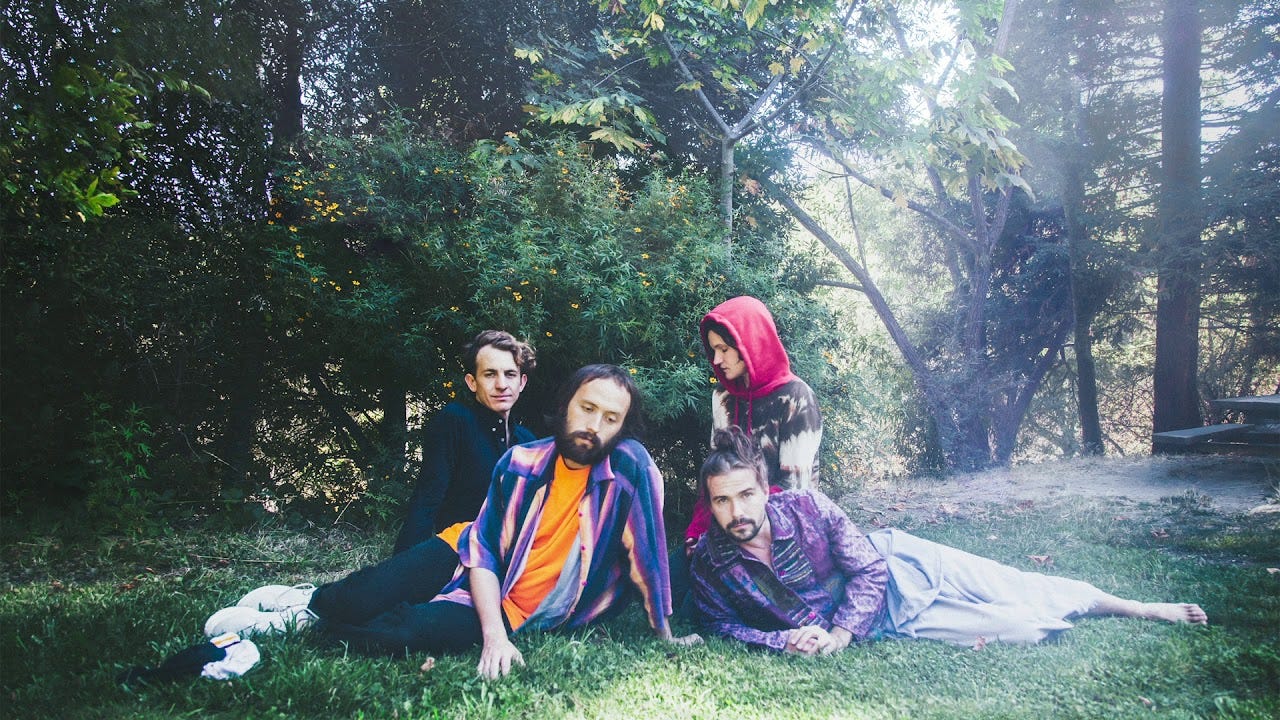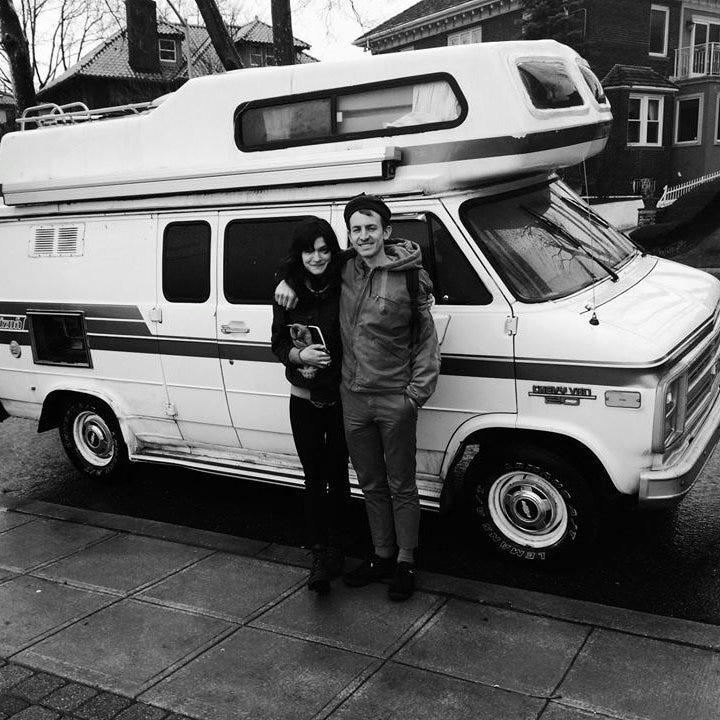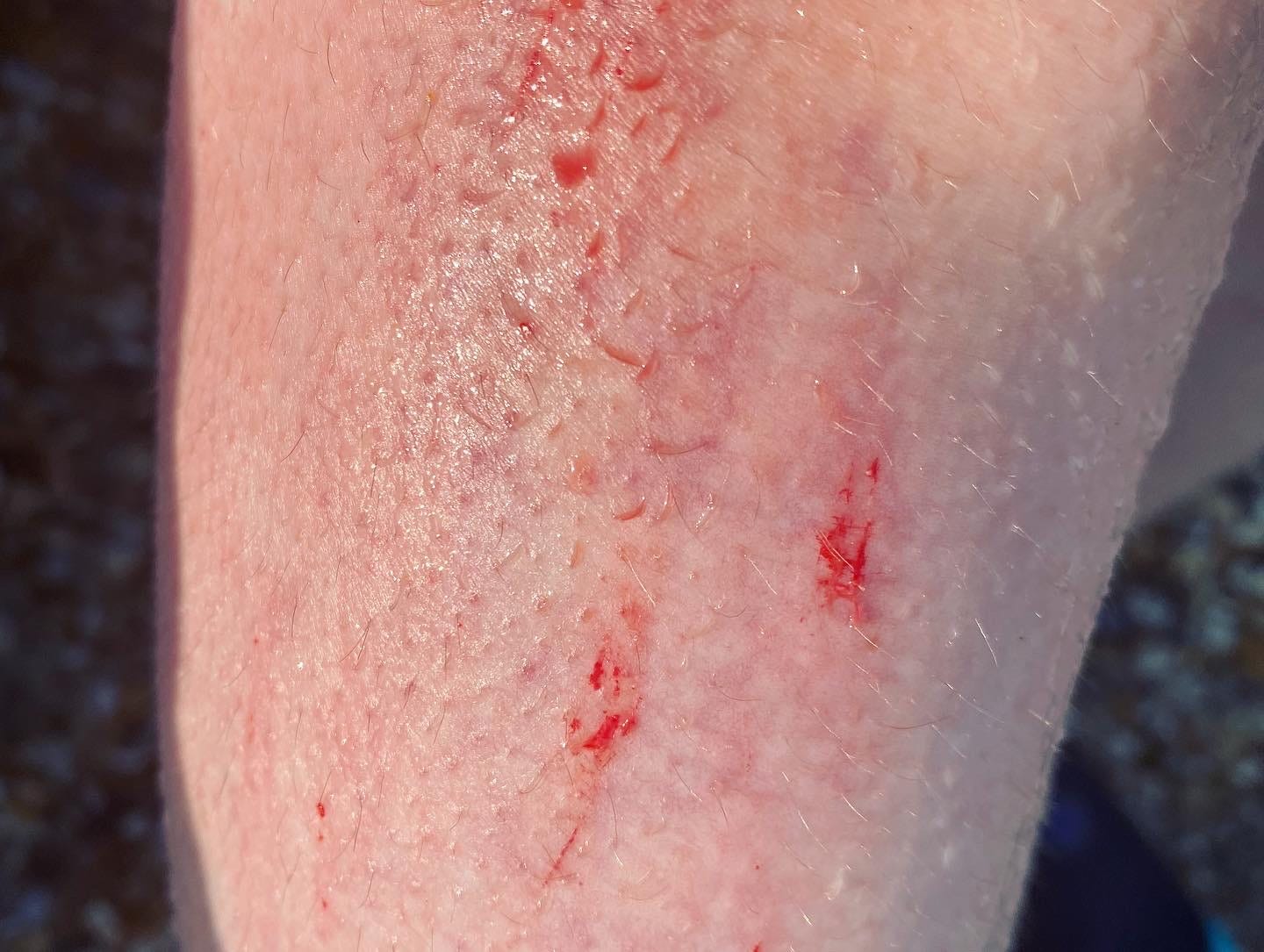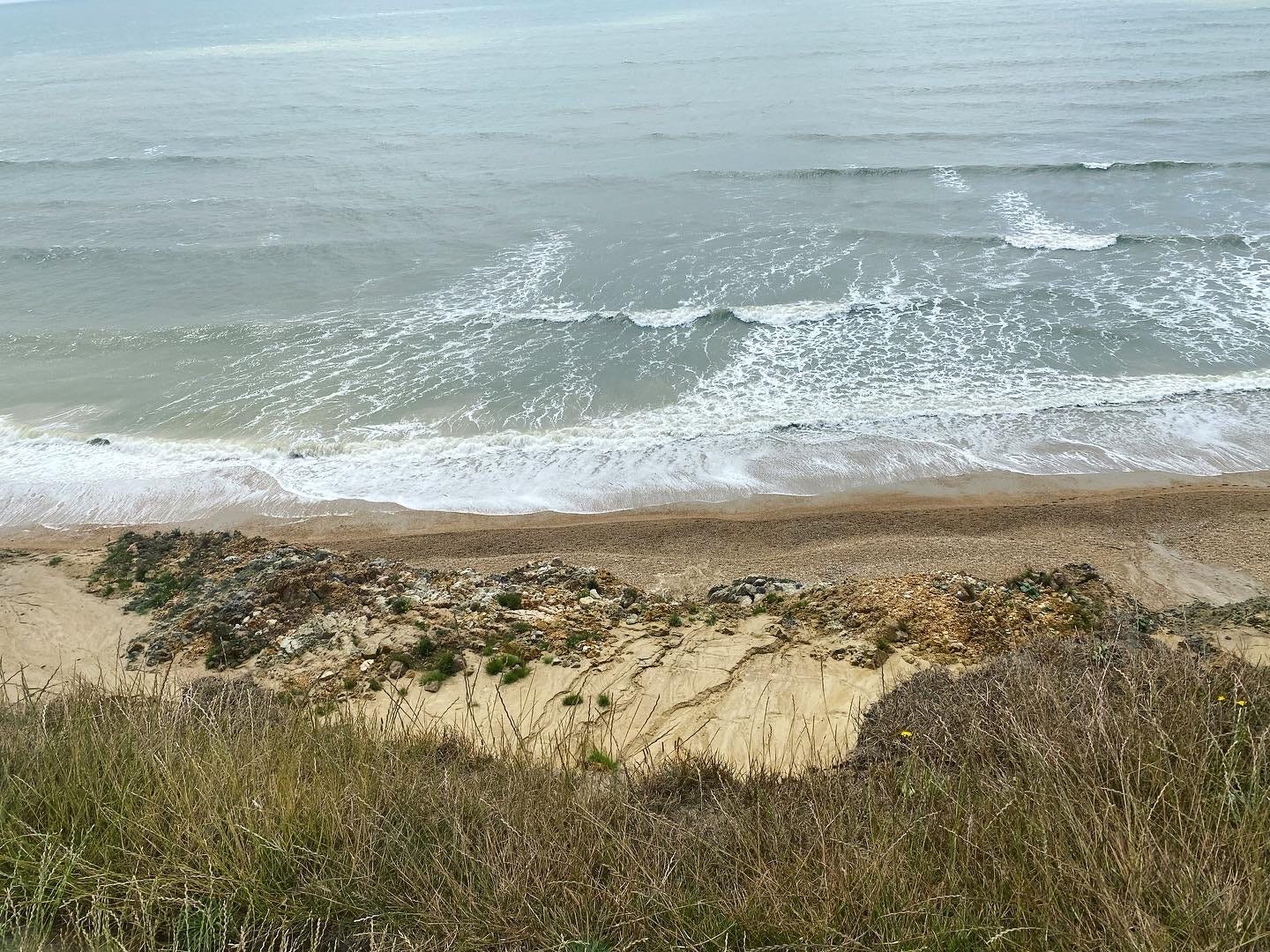The Archives #2: Big Thief's 'Open Desert'
A personal reflection on “leaking through a crack in the door”
When I hear the opening guitar riff to Big Thief’s ‘Open Desert’, stuttering between where the beat accents as if somewhere along the journey of writing it, the compass started spinning wildly, I will forever be reminded of touring with my band pre-pandemic.
Days and places had no outline. Behind the motion blur, heavy city skylines morphed into open deserts themselves. We were supposed to be chasing the dream, but when I looked out at the fields we drove past, the world looked like a dream itself; the trees tiny and plastic, the fields a toy model set. If we never stood in or touched the nature we drove through, it started to feel like it wasn’t really there.
One day on the road to God-Knows-Where, I saw Big Thief had put out a record; U.F.O.F. I laughed to myself. Isn’t it funny how the music that best describes how we feel always finds us at the right time? I felt like such an alien.
I downloaded the track Open Desert onto my phone, and then click, I entered another world.
vacant angel
crimson light
darkened eyelash,
darkened eye
We were driving through the Midlands on the way to Manchester. I hadn’t gone ‘home’ in a while, and immediately the delicate, gentle notes of the acoustic guitar took me back to being a child in the countryside, long bike-rides in the bruised sun, arriving at a lake filled with green and white dragonflies, so beautiful I’d end up “kissing the water”, as Adrianne sings.
As children, we think our homes are the whole world, but in the UK, the Midlands is never a place to stay for long. I used to get told the idiom “sent to Coventry” meant where the prisoners ended up. In a way, yes, but I found out later it originated from the fight for democracy, when royalist prisoners of war were sent to Coventry and shunned. That’s where I’ve said I’m from for years, the only city near my town that people all over the country recognise.
In my lifetime, the Midlands always seems to function as a road to somewhere else. Most English people don’t believe the Midlands is even real unless they've lived there. It doesn't hold the pride and grit of the north, or the gravitas and wealth of the south. It holds nothing, it stays in no one's memory.
Except mine.
the white light of the living room
leaking through the crack in the door
there was never need for more
Lenker never gives context for her lyrics, but the words often speak for themselves. It’s as if she is always standing on the outside looking in. In another solo piece of hers, ‘half return’, she sings of ‘standing in the yard, dressed like a kid. The house is white and the lawn is dead. The lawn is dead, the lawn is dead…’, acutely aware there is no structure we can build big enough to separate us from where we came from. Not even songs.
Mountains become living rooms that become waiting rooms. There is no separation. The two worlds jaggedly crash together into one image. Nature is never too far from man-made structures, and there is something so tragically honest about the imagery of a lawn, the symbol of the American dream, dying.
Not long after I returned from the tour, I discovered a carbon monoxide leak in my house-share in London. I stood outside the building, shaking like a leaf. I’ve never liked being on the outside of things, but that day, I was reminded of my neighbour’s son dying in the shower during a carbon monoxide leak, just twenty years old, the gas “leaking through the crack in the door”. I couldn’t go in.
things we're meant to
understand
crawling closer
to your hand
What is ‘Open Desert’ about? Whose hand is Adrianne crawling closer to?
We’ll never know, and that is the beauty in her songs. I met Adrianne at SXSW in 2019. She’s expressed a fluidity in gender but hasn’t stated preferred pronouns, so for this post, I’ll use ‘she’, simply because using ‘they’ or ‘he’ when people haven’t specifically requested it feels wrong. She advertised her former girlfriend’s set online, Indigo Sparke, who she was guitar tech-ing for, and couldn’t believe people actually came because of her instagram. She spoke about how social media is so strange, and I hung onto every word as if it was dripping like the elixir of life. She’s an incredibly interesting character. A wealth of experience and empathy bleeds out into the world through her lyrics. Raised in a Christian cult until the age of six, she’s lived out of vans quite a few times, spending a summer traveling throughout the midwest and living out of a blue Ford cargo van when she was younger, and living in a van with band-member and former husband Buck Meek.
Within a year and a half after they met, they had bought a 1987 Chevy G20 conversion van together. It was coloured cream with gold and brown trim, and inside it had wood paneling and orange shag carpet. They named her Bonnie. On the cover of those EPs, they're pictured standing in front of the van. They're smiling. "We didn't really have much influence in how to tour or anything like that," Meek says. "We just looked at a map and [thought] 'where do we want to go in this country?'" - The Lore Of Big Thief, NPR
to the poison image
brave surrender
kiss the water
I've always wondered what Adrianne’s ‘poison image’ was. Herself? Because ‘kissing the water’ doesn’t feel like a reference to nature, but instead parallels the imagery of Narcissus. Maybe we can’t talk about narcissism without talking about our collective assault on nature, though. I’ve been thinking a lot lately about how we got here, how we arrived in cities where we can’t afford the rent, how we spend so much time trying to maintain this ridiculous standard of living, and if we can afford to, how it doesn’t feel like living at all. ‘It is death’, a new friend said ever-so-poetically last week.
For me, by the time I was touring in our old ex-postal van, home in the Midlands was the poisoned image. That was one narrative. But I think I knew even then that London was slowly becoming one too. It has green parks, allegedly the most parks out of any city in Europe, but when you’re in them, you can see a shard of glass stick out into the sky, and you can see the buildings of Canary Wharf standing too tall, empty and hollow like infected trees, silver bark still glistening but devoid of life inside, and you can see the two transmitting towers built in the 50s from the ashes of the Crystal Palace poking out as if they’re twin Eiffel Towers. The illusion of being in nature easily cracks.
I used to love London. And I loved my hometown, once. Maybe it’s living itself that feels like poison. We’ve replaced the crimson sun with white light. We’ve made our homes waiting rooms, liminal spaces between life and death, and we’ve vacated our bodies. We’ve built our cities to protect ourselves from the very thing we are.
Artists are starting to document the feeling of being parasites. Anohni just released, ‘Why am I alive now?’. Every lyric I write at the moment contains a nostalgia for the present, a strange grief over the life I’m still living.
Last weekend, I stayed at a friend’s house by the sea. I got on a bike and rode along the coast, and stopped to listen to crickets in the bushes. A wave crushed me and tore up my leg, but I laughed, because it felt like being alive.
Everything about modern life has been a glass cage, the illusion of choice, telling us that everything we want is just beyond the edges of our fingertips. But we never quite reach the window. And what we want is rarely what we need.
For me, the illusion has completely shattered. I want to be in nature while we still have it. I want to experience it, I want to remind myself I am it, in whatever small ways I can. In London, I was always trying to live up to the people around me, people who I now realise were far more economically advantaged. There was just no way I could have kept up. I see that now. It doesn’t make it hurt any less, but I can’t change it. I simply have to cut my losses, move forwards and experience joy in the ways I still can.
after all my teeth are gone
after all the blood is drawn
the white light of the waiting room
leaking through the crack in the door
Death underlines a lot of Lenker’s songs, and it’s unclear if they speak of real deaths, or her own deaths, cyclical, happening again and again, rebirths perhaps. In ‘terminal paradise’, she sings, ‘screaming in the field, as I was born’, a clear cry to return.
“Virtuosity doesn’t resonate for Lenker as much as vulnerability does. In her work with Big Thief and on her solo records, she has always been most interested in making emotional connections”, Amanda Petrusich wrote for the New Yorker. And yet, Adrianne Lenker is one of the rare artists who has both.
In the same article, Buck Meek describes how she writes songs;
“It’s as if she removes her conscious mind from the room,” he said finally. “She’ll hold her guitar, and she’ll start to speak in abstractions, or speak in complete nonsense—just sounds and shapes. Then she emerges from that space, and slowly the words start to form into syllables, and into the English language, and become a story, or a character, or a reflection of her own experience.”
It’s almost as if she doesn’t need to be anyone to write them. She understands that they aren’t separate from herself, like big skylines or towers; they are birds, they are fields, they are mountains. She becomes her own songs. They are her.
As much as we have built this awful structure, we are not parasites. ‘We are nature defending itself’.
through the mirror
mountain view
she has one green
one eye blue
I can see her smiling through
Touring inside that van, something was wrong. Nothing felt real. Lately, I’ve been wondering which world I’m going to pick.
Inside or out?








Googled "big thief open desert meaning" and stumbled upon this. "A wave crushed me and tore up my leg, but I laughed, because it felt like being alive"; those sweet reminders that the colour of living before us is in fact tangible and not mirage wash over like tiny baptisms. Strikingly resonant, thank you so very much for sharing 🫀 going to give Anohni a listen!